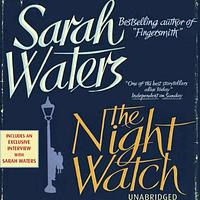Take a photo of a barcode or cover
Sarah Waters is so skillful at weaving together events in a story. When I got to the end, I immediately wanted to go back to the first section of the book to see what I missed, as the events are told in reverse chronological order.
I enjoyed the first part of this book...we begin in 1947 London, still recovering from the war. We meet all the characters, so far, so good, but just as it reaches the point for a real plot to begin, we are dropped back to 1944. Okay, some background...fine. There are some riveting scenes of the Blitz, which is hard to read about but always morbidly fascinating. And our characters suffer some traumas, but there is no tension involved because we already know they came through okay. This section goes on and on until we are dangerously near the end. Do we pop back into the present and get on with the story? Nope, we drop back three MORE years, to what remained of the backstory that we hadn't yet heard (not necessary). The End. Quite unsatisfying, did I miss the point?
Minority groups finding solace and a sense of belonging in the war-ravaged Britain as their existence in times of peace is a war of its own.
Interesting plot, told backwards. Characters were well developed but text was a bit wordy.
I enjoyed this book. It tells the story of four Londoners during World War 1 and how their lives crisscross. I enjoyed the backwards chronology and its always great to feel like you're let in on secret parts of the characters' lives.
It was okay-- some parts were quite boring, but some were interesting. I still had lots of unanswered questions.
adventurous
challenging
dark
emotional
informative
mysterious
sad
tense
slow-paced
Plot or Character Driven:
Character
Strong character development:
Yes
Loveable characters:
Yes
Diverse cast of characters:
Complicated
Flaws of characters a main focus:
Complicated
I had this book pushed on me from someone in my building. I didn't really mind because I saw it was by Sarah Waters who wrote Tipping the Velvet, but I wasn't particularly excited to start this one. I finally cracked it open because said neighbor is moving out soon and I wanted to get it back to him before he left. Now I feel sad that I have to part with it.
I loved this book. It follows the lives of four people backwards through World War II. It begins post-war, in 1947, and you meet these characters who all have some sort of secret or mystery from their pasts. Rather than have the secret "come out" as the story progresses, Waters takes you literally back in time so that you see how the past unfolded while knowing what the consequences ended up being in the future. The result is that you stay strangely in the moment and have a sad sense of premonition as you read the ending first. Although most of the characters are gay, Sarah isn't writing a novel about the "gay" experience of World War II, just quietly illuminating the lives of gay people living through the war like everyone else. Sarah pays special attention to the nuances of desire, guilt, and regret. Her characters are carefully and finely drawn and her dialog is heart-wrenching in its honesty. Sarah's writing has matured so much that, as much as I liked Tipping, it feels like pure fluff next to this.
I loved this book. It follows the lives of four people backwards through World War II. It begins post-war, in 1947, and you meet these characters who all have some sort of secret or mystery from their pasts. Rather than have the secret "come out" as the story progresses, Waters takes you literally back in time so that you see how the past unfolded while knowing what the consequences ended up being in the future. The result is that you stay strangely in the moment and have a sad sense of premonition as you read the ending first. Although most of the characters are gay, Sarah isn't writing a novel about the "gay" experience of World War II, just quietly illuminating the lives of gay people living through the war like everyone else. Sarah pays special attention to the nuances of desire, guilt, and regret. Her characters are carefully and finely drawn and her dialog is heart-wrenching in its honesty. Sarah's writing has matured so much that, as much as I liked Tipping, it feels like pure fluff next to this.
You know, I really loved this book. It's a slow burner for sure but that just adds to it's beauty and sadness. It centers on the overlapping lives of four main characters during WW2: Kay, Viv, Helen and Duncan and is told backwards. It starts in 1947 and takes us back to 1941 and we get to see how the characters turned into who they are rather than watch them turn as we go. Which, for me, was pretty cool.
I can't write too detailed of a review because of spoilers but I will say that this is very much a book about the subtler effects of the war on individuals and I think that's where a lot of the criticism seems to be coming from about there being 'no real story'. People have these ideas about War Stories, don't they? That they need to be as big and as explosive as the bombs that fall in them. People forget, or aren't aware of, that even during the blitz people were still just trying to be people.
The stand-out characters and story in this book for me were Kay and Viv and without saying too much, theirs is a story, and Kay is a character, that shows us basic human kindness and goodness during a time when humans were being their very worst to each other.
I can't write too detailed of a review because of spoilers but I will say that this is very much a book about the subtler effects of the war on individuals and I think that's where a lot of the criticism seems to be coming from about there being 'no real story'. People have these ideas about War Stories, don't they? That they need to be as big and as explosive as the bombs that fall in them. People forget, or aren't aware of, that even during the blitz people were still just trying to be people.
The stand-out characters and story in this book for me were Kay and Viv and without saying too much, theirs is a story, and Kay is a character, that shows us basic human kindness and goodness during a time when humans were being their very worst to each other.






